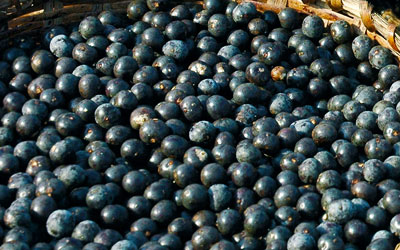Metabolic syndrome is a cluster of conditions that occur together, increasing the risk of stroke, heart disease, and type 2 diabetes. Studies have shown that antioxidants may be a valuable tool in preventing as well as treating certain metabolic syndrome complications.1
While acai berries are known to be packed with antioxidants, the extent of their antioxidant properties has not been tested in many human studies. This trial evaluated the effects of acai on metabolic risk factors in overweight adults.
The Study
This uncontrolled, open label pilot study was conducted at the Staywell Research facility in Northridge, California. Pilot studies are small-scale trials, designed to test the procedures and methods that will be used in larger trials.
It involved a small group of 10 overweight adults, with a body mass index between 25kg/m2 and 30kg/m2. They consumed smoothies made with 100 grams of acai pulp, twice a day for 30 days.
Researchers were interested to see how eating acai affects the levels of several metabolic syndrome markers, including fasting plasma glucose, insulin, cholesterol, triglycerides, exhaled nitric oxide metabolites, and plasma high sensitivity C-reactive protein.
The Results
After 30 days of drinking acai fruit pulp smoothies, participants showed significant reductions in the following metabolic syndrome markers: fasting glucose and insulin levels as well as total cholesterol, LDL-cholesterol, and the total cholesterol to HDL-cholesterol ratio.
Consuming acai has also shown to substantially reduce the postprandial increase in glucose levels.
What Does this Mean?
As shown by the results of this trial, eating acai can reduce the risk of metabolic syndrome in overweight adults thanks to the fruit's effects on glucose, insulin, and cholesterol levels.
Studies have previously shown beneficial effects of anthocyanins (natural pigments with antioxidant properties found in red, purple, and blue fruits and vegetables, including acai) on diabetes and the metabolic syndrome. However, since this was an uncontrolled pilot study, more trials are necessary to explore the potential benefits of acai for metabolic disorders.
Other herbs that may help prevent metabolic diseases are tomatoes, pears, blueberries, and peanuts.
Sources
- Nutrition, Effects of Acai (Euterpe oleracea Mart.) berry preparation on metabolic parameters in a healthy overweight population: a pilot study, 2011
Footnotes:
Current Pharmaceutical design. (2016). The potential role of antioxidants in metabolic syndrome. Retrieved November 5, 2022 from https://pubmed.ncbi.nlm.nih.gov/26648468/







